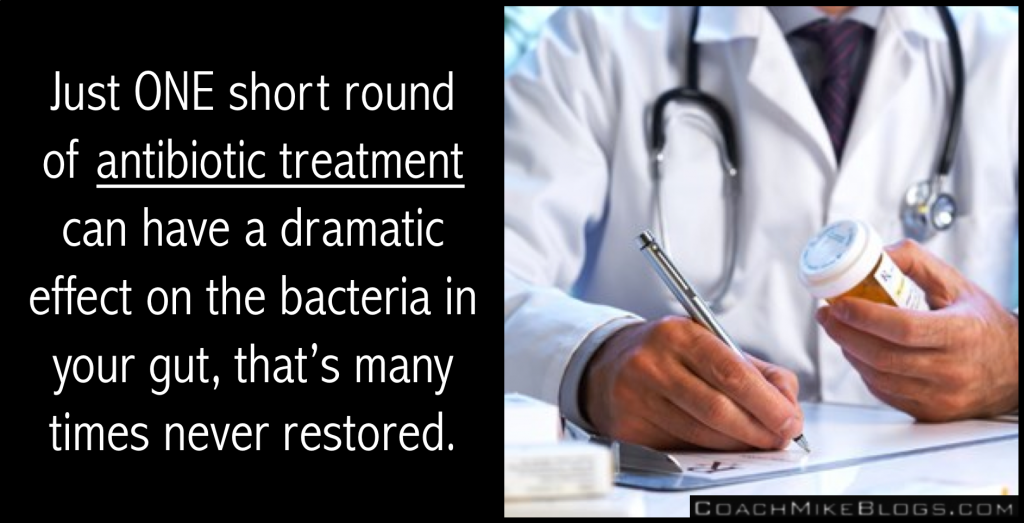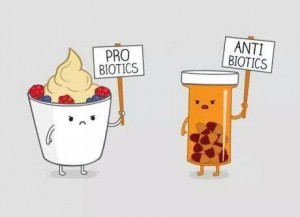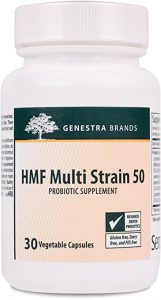One of the great debates of the 21st century, is why we’re seeing such a drastic increase in gastrointestinal problems, food sensitivities, and auto-immune conditions.
Since 1974 Celiac Disease has increased 5-fold in the United States!
Sure, there’s been a decline in food quality, sleep, and activity, and a rise in stress, environmental toxins, and sugar, which all negatively influence our gut health. But clearly there’s something ‘bigger’ at play here that explains the significant jump?
Call it speculation, but all signs point to the overuse of antibiotics – as even ONE short round of treatment can have a dramatic effect on the bacteria in your gut, that’s many times never restored. And along with the introduction of antibiotics occurring less than 100 years ago, doctors have only been giving them out like hot-cakes (for everything under the sun) for the last 40.

Without beneficial bacteria (healthy flora) in our gut we’re more susceptible to damage and infection – as we lose our natural protection from bad bacteria, that start setting up shop (colonizing) in our gastrointestinal tract.
Research has demonstrated that individuals with Irritable Bowel Disease (Chron’s, colitis) have lower levels of protective bacteria (bifidobacteria, lactobacillus) and have found similar imbalances with auto-immune conditions.
Now, whether the poor gut flora or infection is causing the leaky gut (1, 2) that’s driving the auto-immune condition is debatable. But we do know that a bacterial balance is necessary for a proper immune response, and antibiotics strip away the healthy gut flora that would have otherwise provided an extra layer of support.
So, does this mean we avoid taking antibiotics at all costs?
Unfortunately, no; as in certain situations they’re absolutely necessary. But it does mean looking at the risk-to-benefit ratio of taking them, and counteracting the negative effects when they are.
Since antibiotics kill ‘all’ bacteria in our gut, we need to prioritize restoring the beneficial flora with a probiotic supplement and plenty of fermented foods.
The reason fermented foods are important in addition to a probiotic is because they add bacterial diversity. Which tends to be more of a cause for concern than total bacteria after antibiotic treatment.
We also need to remove ALL irritating and inflammatory foods that promote bad bacterial overgrowth and gastrointestinal damage. And look for ways to incorporate more gut healing and protecting foods (like bone broth, vinegar, and coconut oil), and plenty of vegetable matter (prebiotics) so we’re ‘feeding’ this new bacteria.
Interestingly, supplementing a probiotic during antibiotic treatment seems to be beneficial. Which may sound goofy – since antibiotics kill probiotics – but research has shown less side effects (1, 2, 3, 4, 5) and a lower risk of infection (1, 2). With one study from 2005 in the journal International Immunopharmacology showing the superiority of a probiotic supplement ‘during and after’ antibiotic treatment, compared to ‘after’ only.

Whatever you decide, the message is clear:
Antibiotics compromise gastrointestinal health, so healing the gut after (and during) treatment is critical.
Obviously, no antibiotics would be ideal, and it’s important to weigh your options when the opportunity presents itself. But sometimes it’s required, which makes damage control a necessity.
Stay Lean!
Coach Mike
RELATED ARTICLES:
WGA - The Other Gut-Buster in Wheat
Fermented Foods - The Better (& Cheaper) Probiotic
Anxiety & Depression - Chemical Imbalance or Dietary Disaster?

